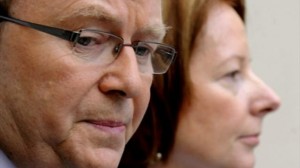 It’s been an extraordinary day in Australian politics, where Julia Gillard has called a leadership vote for Monday in the latest showdown of a long-simmering feud with foreign minister and former prime minister Kevin Rudd that has undermined the Labor Party almost since it took over government in 2007.
It’s been an extraordinary day in Australian politics, where Julia Gillard has called a leadership vote for Monday in the latest showdown of a long-simmering feud with foreign minister and former prime minister Kevin Rudd that has undermined the Labor Party almost since it took over government in 2007.
Rudd, who’s been visiting Washington, DC, resigned as foreign minister today in a press conference outside of Washington’s Willard Hotel, announced he will return immediately to Australia, indicating that he would stand for the leadership against Gillard:
I do not believe that Prime Minister Gillard can lead the Australian Labor Party to success in the next election. That is a deep belief, I believe it’s a belief also shared right across the Australian community…. Their overall argument to me is that they regard me as the best prospect to lead the Australian Labor Party successfully to the next elections, to save the Australian Labor Party and those next elections and to save the country from the ravages of an Abbott government.
One commentator said earlier today that the feud has left them both “screwed” — Rudd unable to win the leadership and Gillard unable to win the next election.

Former Nigerian president Olusegun Obsanjo arrived today in Dakar as a representative of the Economic Community of West African States to meet with the M23 opposition group, which is protesting Senegalese President Abdoulaye Wade’s bid for a third presidential term as unconstitutional. (Ironically, Wade himself was among those who criticized Obsanjo in 2006 when he sought constitutional changes to allow for a third term as Nigeria’s president).
Meanwhile, technically illegal protests continue in Dakar in advance of Sunday’s vote, with tensions running high and occasionally spilling into deadly violence.
But with five days to go until it appears that the 85-year-old Wade will prevail to “win” a third term in office unitl the year 2019, just how strongly rooted is democracy in Senegal? Continue reading A historical look at Senegalese democracy →
MAKING WORLD POLITICS LESS FOREIGN
 It’s been an extraordinary day in Australian politics, where Julia Gillard has called a leadership vote for Monday in the latest showdown of a long-simmering feud with foreign minister and former prime minister Kevin Rudd that has undermined the Labor Party almost since it took over government in 2007.
It’s been an extraordinary day in Australian politics, where Julia Gillard has called a leadership vote for Monday in the latest showdown of a long-simmering feud with foreign minister and former prime minister Kevin Rudd that has undermined the Labor Party almost since it took over government in 2007.![]()
